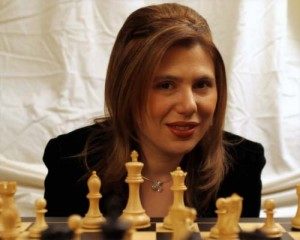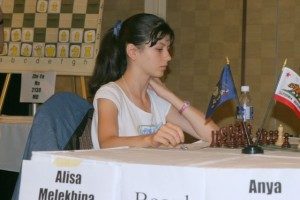Scholastic Chess interview of Katherine Neville about The Eight
“Alisa and The Eight“
February 2005
Alisa and The Eight
NM Dan Heisman was kind enough to inform me about the following interesting story involving WFM Alisa Melekhina, the 6th-place finisher in the Girls Under-14 category of the recent World Youth Chess Championship held in Greece. Novelist Katherine Neville has a penchant for including chess in her books and writes in a delightfully animated manner. She mentioned to me that Dan, who has produced a CD on the Fried Liver-Lolli opening, was assisting her in the correction of an inadvertent typesetting error involving this variation in her book The Eight. Katherine continues, “I decided to update and fix it when I finished the sequel I’m working on now. I mentioned to Dan that I was having trouble with the sequel, because my heroine had been a child chess prodigy – the daughter of Cat Velis and grand master Alexander Solarin, characters from the previous book – but that I myself had never been a child prodigy at anything. Hard to identify with something you have never been. So Dan put Alisa in touch with me. Surprisingly, Alisa told me right off the bat that she had already read The Eight and loved it – and added that she was my fellow author, having published her own translation of a Russian fairy tale when she was six! Among other connections, she mentioned that her father (like the father of my young heroine) had taught Alisa chess – and, even more surprisingly, he is also named Alexander!”
I was curious if the heroine in this sequel was modeled after Alisa and Ms. Neville was quick to reply. “No … Actually, I would not wish to jinx Alisa’s chess career by having any of the things happen to her that are going to be happening to my heroine in the book! Alisa has been most helpful though, in sending me many of the games she has played in international competition, both on winning and losing sides, which I thought was quite brave of her, and also in sharing her inner thought process about sensory perception, especially vision.”
“I try to put some chess into every book,” she explained, “because it is so archetypal and its roots go back so far in our collective memory. Indeed, I have a few things to say in the sequel about exactly how far back those roots may lie!” So does this author play chess herself? “I am an awful chess player, but I love everything about chess. Almost everyone I ever dated was a chess devotee … I actually checkmated an Austrian boyfriend once, and didn’t even know I had him in check! We were playing lightning chess, and I kept saying ‘move! move!’ Finally he said ‘Move where? I am in checkmate and you never mentioned it!’ So that was the end of that relationship – which also convinced me that my chess playing days were over!”
It turns out that Alisa is not the first chessplayer that Neville has worked with. “In my book, A Calculated Risk, I was helped by the co-authors of Warriors of the Mind – Dr. Nathan Divinsky, (former president of Canadian FIDE) and British grand master Raymond Keene – who both sent me games that could be used in a dazzling scene by the future patriarch of the Rothschild family. It may interest your readers to know that the game that appears in that book is one that Dr. Divinsky found, dating from the exact period that Rothschild would have been explaining to the others how to win it! In The Eight, I was helped by being a member of the Mechanics Institute Library of San Francisco, possessors of a fabulous chess book collection with a chess room where tournaments are played. And also by my friend Aileen Des Moulins, a chess player who lived not far from my tree house in Sausalito, just north of San Francisco … Aileen shared thoughts of how it felt to be a female in a male dominated game, and she helped me find, through a friend of hers, a game that would fit my plot (The Eight is based on a real game in world championship competition, where White resigns when Black’s passed pawn gets to the sixth rank. Only one reader has ever guessed which game it was).”
Any final thoughts about working with Alisa? “For an author like me, who is interested in the quest of the mind, as well as the adventure of the quest, it has been quite refreshing to see a young girl like Alisa who is very good at something as complex and competitive as chess but who can still lead a normal life incorporating a variety of interests. Before I met Alisa, all the precocious children I had known were quite driven – and like my heroine, their parents were worried about their obsession (indeed, in The Eight sequel, they will have more than one reason to worry!). So Alisa’s parents must be credited with being focused yet supportive.”
As for 13-year-old Alisa herself, she was born in the Ukraine and began playing chess at the age of five. As Alisa explains, “My father is the best (and only) chess teacher I had,” although her father also credits FM Aviv Friedman with assisting Alisa in several international tournaments. In addition to Alisa’s strong showing at the WYCC in Greece in November 2004, she also won the title of U.S. Girls Under 12 champion in May 2004, and placed second at the Polgar Invitational tournament in August 2004. Quite a year for young Alisa!
Her talents, however, are not limited to chess. The straight-A student is fluent in Russian as well as English, and enjoys ballet, volleyball and reading, especially the Harry Potter books, and is active in the school choir.
Photos (from left): GM Susan Polgar and WFM Alisa Melekhina
(photo of Alisa from Chess Daily News)
Although not yet a USCF Master, she received her WFM title at the age of 9 when she took first place in the Pan American championship for girls under 10. Her typical day includes between two and three hours of chess study. Asked to describe her chess training regimen, she said that she and her father “study chess openings, endings, middle game positions, and do several chess tactics problems. I will also probably play against the computer (Fritz or Chessmaster).”
She has already participated in international tournaments in Argentina twice, in Greece twice, and in Spain. She also plans on attending the 2005 World Youth Chess Championship in France.
What advice would Alisa offer to other aspiring chessplayers? “I would tell them to take the game seriously and practice everyday. They should also play in a lot of tournaments and spend less time playing blitz.” Alisa’s father, Dr. Alexsandr Melekhin, a Class A player himself, stresses the practice. As he notes, it was eight years of “everyday boring practice” and her talent that has allowed her to reach her current level. Dr. Melekhin and his wife, both dentists from the former USSR, have altered their practice schedule to accommodate Alisa’s tournament schedule. I asked Dr. Melekhin if Alisa has faced many obstacles as a girl playing in a male-dominated sport. Interestingly, he commented that he feels this has not been an obstacle at all. Rather, the tough competition has only strengthened her play.
Congratulations to Alisa and best wishes for continued success. We look forward to following her progress.
Article by Steve Goldberg for Scholastic Chess

